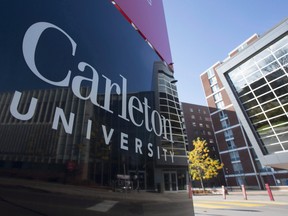Marni Soupcoff: Carleton cancels the police
The school’s Institute of Criminology and Criminal Justice will no longer be allowing student placements with the RCMP, local police or prisons

Article content
Here is a new one for the cancel culture history books: Carleton University’s criminology department has decided to cancel the police. In a recent statement, the school’s Institute of Criminology and Criminal Justice (ICCJ) explains that it will no longer be allowing student placements with the RCMP, local police or prisons.
The move is one of several that the department is taking to “address issues related to settler colonialism, white supremacy and systemic racism.” It also plans to establish a faculty committee for anti-racism and anti-colonialism initiatives, for example. And new student bursaries for Black, Indigenous and other racialized students are in the works.
These other changes seem unlikely to achieve the ICCJ’s sought-after state of social justice and will likely prove to be mildly ineffectual, in the way that so many exercises in academia are. Yet it is its decision to end the student placements that stands out as a destructive policy change, as it will take away the opportunities that students have previously had to experience the very institutions they are supposed to be studying, and perhaps even helping to improve.
It is almost as though the criminology faculty has had an adult temper tantrum. It has decided that Canada’s police and correctional services are so systematically racist that they are “impervious to reform.” So it is now giving these institutions the silent treatment, teaching them a lesson by pretending they do not exist.
I would argue that this is not a great strategy in any conflict. But it is especially illogical when the institutions being pointedly frozen out happen to have enormous power and presence. “Prisons? We don’t deal with prisons,” Carleton may say. “We wash our hands of prisons.” Meanwhile, tens of thousands of people will remain incarcerated. The only difference will be that Carleton criminology grads will no longer have seen first-hand how prisons work, or even how racism may play out in them.
If you look up Carleton’s Institute of Criminology and Criminal Justice on the web, you will find a section for students called “What can I do with my degree?”
Here are some of the career opportunities and job titles the university lists, to give students an idea of what they might do with their Carleton education: police officer, inmate records co-ordinator, correctional officer, detention officer, guard, correctional rehabilitation officer, juvenile detention counsellor, bailiff, undercover investigator, parole officer. I am no criminologist, but I strongly suspect a student aspiring to any one of these positions would benefit from a prison or police placement.
Or maybe that is the point. Maybe the criminology department is hoping that it will stop graduating future police officers, correctional officers and the like. Maybe the idea is to limit Carleton criminology grads’ career opportunities. For the greater good, of course.
On Tuesday, Lara Karaian, a member of Carleton’s criminology faculty, posted a link on Twitter to the department’s statement about ending student placements with police and prisons. Several people identifying themselves as graduates of the program responded with disappointment.
“I did an ICCJ placement at (Correctional Service of Canada), evaluating efforts to strengthen offender-staff relations,” Alex Yeaman wrote. “I now do community-based work diverting youth from courts, partnering with universities on evaluation. Institutions are improved when partnered with universities. This is a bad idea.”
In response, the best Karaian could do was to gently correct the graduate’s conclusions about his own experience. ”I would argue,” Karian tweeted, “that your collective university experience made you the critical thinker that focuses on criminal diversion, not one placement at the CSC. Different placements could have led you to the same place.”
Apparently, admitting that even a single corrections placement might have done some real good for someone who has taken the Carleton-approved approach to crime (criminal diversion) is a bridge too far. Better to speculate about alternate realities that would have better served the Carleton criminology department’s worldview.
It is a shame that the school has chosen to respond with an institutional emotional outburst to a problem that could truly use creative solutions from up-and-coming criminologists and future police and prison workers. Fortunately, though, the Carleton criminology department’s eminence is not such that its short-sighted grab for attention will prevent progress in criminal justice reform.
The thinkers and actors with the rich experiences needed to implement real improvements to policing and prisons will still graduate from quality criminology programs around the world. They just won’t be graduating from Carleton.
National Post
soupcoff@gmail.com
Twitter.com/soupcoff













Postmedia is committed to maintaining a lively but civil forum for discussion. Please keep comments relevant and respectful. Comments may take up to an hour to appear on the site. You will receive an email if there is a reply to your comment, an update to a thread you follow or if a user you follow comments. Visit our Community Guidelines for more information.